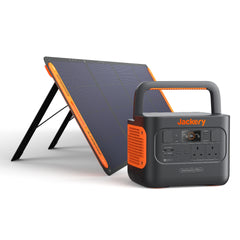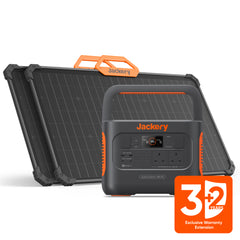Jackery Solar Generators are available in many sizes and capacities. The popular Jackery Solar Generator 1000 Plus and Jackery Solar Generator 2000 Plus feature a LiFePO4 battery with 1264Wh and 2042.8Wh capacity, respectively. Jackery Solar Generator 2000 Pro has an NMC capacity to supply interrupted power to 96% of appliances, including rice cookers. Here, we compare the different Jackery Solar Generators that can power rice cookers.
|
Products |
Image |
Capacity |
Rated / Peak Power |
Battery |
Size |
|
 |
2kWh to 12kWh |
3000W (6000W Peak) |
LiFePO4 |
Length: 14.7 in (37.36 cm) Width: 18.6 in (47.3 cm) Height: 14.1 in (35.94 cm) |
|
|
 |
2160Wh |
2200W (4400W Peak) |
NMC |
Length: 15.1 in (38.4 cm) Width: 10.5 in (26.9 cm) Height: 12.1 in (30.75 cm) |
|
|

|
1.25-5 kWh |
2000W (4000W Peak) |
LiFePO4 |
Length: 14 in (35.6 cm) Width: 10.24 in (26 cm) Height: 11.14 in (28.3 cm) |
Rice Cooker Wattage Key Takeaways
Before we dive deep into rice cooker wattage, here are a few key takeaways.
- The rice cooker wattage generally lies between 300W and 1500W.
- Some factors influencing the wattage include size, cooking time, functionality, etc.
- A small rice cooker can consume nearly 3kW of electricity in an hour.
- If you are using a rice cooker for one hour every day, it will typically draw 9kW in a month and 108kW in one year.
How Many Watts Does A Rice Cooker Use?
Any standard rice cooker consumes 400 to 1000W of electricity in cooking mode and draws 30 to 50W in the warm mode. Every time you use the rice cooker, it will draw 0.7kW. On the other hand, a typical rice cooker uses 0.5kW per hour. However, this is not the exact watt consumption. Instead, the rice cooker's wattage varies depending on the brand, model, and size.
|
Types |
Wattage |
Capacity in Liter |
Suitable For |
|
Small Rice Cooker |
300 to 500 watts |
0.2 - 0.7 liters (1 to 3 cups) |
Individuals or small households. |
|
Medium Rice Cooker |
600 to 900 watts |
0.9 - 1.9 liters (4 to 8 cups) |
Small to medium-sized families. |
|
Large Rice Cooker |
1000 to 1500 watts |
2.3 liters or more (10 cups or more) |
Larger families or when cooking for events. |
If you are using a 700-watt rice cooker on 230V, it typically needs 5.93 amps or less. On the other hand, a smaller rice cooker would use only 2.5 amps at 230 volts.
The following table shows the watt consumption of rice cookers from different brands.
|
Rank |
Brand |
Capacity in Liters |
Rated Input Power (Watts) |
|
1 |
Prestige |
1.8 |
650 |
|
2 |
Inalsa |
1.8 |
700 |
|
3 |
Maharaja Whiteline |
1.8 |
650 |
|
3 |
Butterfly |
1.8 |
700 |
|
4 |
Panasonic |
1.8 |
650 |
|
4 |
Next |
1.8 |
650 |
|
4 |
Morphy Richards |
1.8 |
700 |
|
5 |
Reconnect |
1.8 |
700 |
|
5 |
Philips |
1.8 |
700 |
|
5 |
Usha |
1.8 |
650 |
|
6 |
Bajaj |
1.5 |
350 |
What Factors Affect A Rice Cooker Wattage?
Rice cookers are great appliances, but they consume a lot of energy, which determines the wattage. Here are the key factors affecting the rice cooker wattage.
Size and Capacity: The cooker's size and capacity affect the total energy usage. A large rice cooker uses more energy than a smaller one — even if you are cooking the same quantity of rice.
Rice Cooker Functionality: The more functions a rice cooker has, the more watts it will consume. For example, the "keep warm" function can maintain the cooked rice temperature for a long period. Although the feature is convenient, it draws a lot of electricity and increases the watt consumption.
Cooking Time: The duration for which the rice is cooked directly impacts the wattage consumption. When you cook for long hours, it will require more energy.
Insulation and Construction: A well-insulated rice cooker is designed to retain heat effectively, which reduces the need for additional power to maintain the required cooking temperature.
Water Usage: When you are using too much water, the rice cooker will need more energy to boil off the excess water. The correct rice-to-water ratio is one of the best ways to reduce energy usage and watt consumption.
How Much Does It Cost to Run A Rice Cooker?
A low-wattage rice cooker typically uses between 620 and 700W of electricity during the cooking process. If the rice cooker draws anywhere around 627W or 0.627kW of electricity, the operational cost is around 0.26p. The cost per hour, in this case, is 13.6p. If you are leaving the rice cooker on warm for an hour, it will cost 27.2p per day. That means running a rice cooker will cost around £7.7-9.7 per month.
One way to offset the high electricity bills is using a solar generator. It uses free solar energy to power home appliances, helping you reduce the high electricity bills. Jackery Solar Generators are portable and powerful charging solutions for most appliances, like rice cookers. They are lightweight, so you can carry the power station anywhere for indoor and outdoor use to supply interrupted power supply.
Jackery Solar Generators for Rice Cookers
Jackery is the leading brand that manufactures solar generators, power stations, and solar panels. The Jackery Solar Generators combine the Jackery Explorer Portable Power Stations and Jackery SolarSaga Solar Panels to charge home or outdoor electrical devices.
The solar generators are portable, lightweight, and powerful batteries that can charge rice cookers during power outages, camping, RVing, blackouts, or brownouts. The solar panels capture the direct sunlight and convert it into DC. The built-in inverter of the power station converts the DC to AC electricity to power devices like rice cookers.
Jackery Solar Generator 2000 Plus
The Jackery Solar Generator 2000 Plus has a LiFePO4 battery of 2042.8Wh capacity and can be expanded to 24kWh using the additional Jackery Battery Pack 2000 Plus. It has a longer battery life and can be recharged via 6*Jackery SolarSaga 200W Solar Panels in 2 hours. If you are looking for a whole home battery backup solution, the Jackery Solar Generator 2000 Plus will make sense.

Customer Review
"Enough power for me for van camping or in a power outage. Holds charge well. Heavy, but the handle is sturdy, and so are the wheels so easy to move." — Mo.
Jackery Solar Generator 2000 Pro
If you want to charge only the essential home appliances, the Jackery Solar Generator 2000 Pro has your back. With an NMC battery of 2160Wh capacity, the solar generator can charge 96% of home appliances. It features a foldable handle that makes carrying more convenient. The 6*Jackery SolarSaga 200W Solar Panels can recharge the home battery backup in 2.5 hours.

Customer Review
"Easy to charge. Perfect for our condo, where we cannot have an outdoor generator. It will let us have heat in the bedroom and run a CPAP machine." — Audrey Bell.
Jackery Solar Generator 1000 Plus
Like the Jackery Solar Generator 2000 Plus, the Jackery Solar Generator 1000 Plus has a LiFePO4 battery of 1264Wh capacity. It is compatible with the additional Jackery Battery Pack 1000 Plus to expand the capacity from 1.25kWh to 5kWh. With the help of this home battery backup, you can power all home appliances for days.

Customer Review
"Power packs are easy to set up, charge, and move around. Weight and size make the units easy to move when and where they are needed. Easy to read display. Good for charging multiple devices." — Gary Way.
| Products |
Small Rice Cooker Working Hours (300-500W) |
Medium Rice Cooker Working Hours (600-900W) |
Large Rice Cooker Working Hours (1000-1500W) |
|
3.4-5.7H |
1.9-2.8H |
1.1-1.7H |
|
|
3.6-6.1H |
2-3H |
1.2-1.8H |
|
|
2.1-3.5H |
1.1-1.7H |
1H |
How to Save The Cost of Running A Rice Cooker?
Rice cookers draw a significant amount of electricity that eventually contributes to the electricity bills. Here are a few tips to reduce the cost of running a rice cooker.
- Select the right size rice cooker that aligns with how much rice you want to cook. A small rice cooker would be a great option if you want to cook rice in smaller quantities.
- Avoid adding excess water, which can often lead to long cooking times.
- Before cooking rice, soak them for 20-30 minutes. This will reduce the cooking time and even energy consumption.
- While cooking, keep the cooker's lid closed to avoid heat and pressure loss.
- Power your rice cooker with the help of solar generators to eliminate the cost of running a rice cooker.
- The "keep warm” mode consumes a lot of power, so minimize its usage.
- Always keep the rice cooker clean, as dirty appliances can increase power consumption and reduce its efficiency.
Rice Cooker Wattage FAQs
How many watts does it take to cook rice?
The rice cooker's wattage consumption will depend on the specific recipe and quantity of ingredients. Generally, it takes around 15 or 20 minutes to cook rice in a 1000W cooker.
Do rice cookers use a lot of electricity?
All rice cookers are generally considered to be energy-efficient cooking appliances and consume little electricity. The actual power consumption of the rice cooker will depend on size, specific model, and additional features.
What size of generator do I need to run a rice cooker?
If you are using a 500W rice cooker for 2 hours every day, the daily electricity consumption can be calculated as follows:
Watt-hours or Kilowatt-hour = Wattage × Hours of Operation = 500W × 2H = 1000Wh
Let's take an example to understand better:
Suppose you use Jackery Solar Generator 2000 Plus to charge a rice cooker of 1000W. The running time of the generator can be calculated as follows:
Working Hours = Battery capacity * 0.85 / Operating wattage of the appliance = 2042.8Wh * 0.85 / 500W = 3.4H.
How does the wattage of a rice cooker affect its performance?
The rice cooker's wattage determines how quickly the appliance can cook rice. In other words, higher-wattage rice cookers can cook rice more efficiently and faster than low-wattage rice cookers.
Is it more energy-efficient to use a rice cooker or cook rice on a stove?
A rice cooker is typically more energy-efficient than a stove. This is because a rice cooker is designed to use minimal energy and can switch to a "keep warm" mode automatically after the rice is cooked.
Final Thoughts
With the help of rice cooker wattage, you can understand its usage and efficiency. Rice cookers typically consume 300 to 1500 W of electricity, which can contribute highly to your bills. If you wish to maximize energy efficiency and reduce the high electricity bills, you can trust solar generators. Jackery Solar Generators are designed to power all different sizes and capacities of rice cookers. These solar generators are powerful and portable enough to charge all appliances for long hours.




























































































